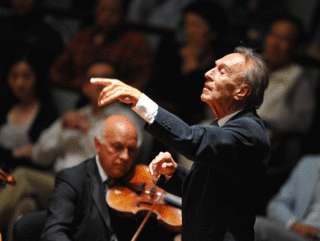|
Back
The Real Mahler Beijing
Concert Hall, National Centre for the Performing Arts
09/24/2009 - & September 25
Wolfgang Amadeus Mozart: Two Arias, K. 418 & 383
Gustav Mahler: Symphony No.4 in G major
Rachel Harnisch (Soprano)
Lucerne Festival Orchestra, Claudio Abbado (Conductor)

Claudio Abbado (© Luo Xiao Guang)
Last week, music aficionados in Beijing witnessed four concerts by Mr. Abbado and his Lucerne Festival Orchestra that were memorable for lifetime. On Sunday and Monday evenings, they presented Mahlerís First Symphony, and Prokofievís Third Piano Concerto in the first half with Yuja Wang as soloist. The impeccable Mahler soon flushed the youthful pianistís relatively dazzling but shallow playing away.
On Thursday and Friday, Mr. Abbado returned with soprano Rachel Harnisch for Mahlerís Fourth Symphony. The two Arias by Mozart merely served as appetizers of the evening. Ms. Harnischís edgy voice at high pitches brought me a sense that she was not well-prepared and fully warmed up before the performance. However, it was again the Mahler Symphony that outshone all these flawed reminiscences, transfiguring the concert into the most idealized perfection. Indeed, there was totally no awareness that this was a performance of Mahler. Instead, it was a transcendental listening experience in which how Mahlerís music should sound like. It was the real Mahler!
This was an occasion to reflect that one is unlikely to ever hear Mahler played better. Although, comparing to Mr. Abbadoís version with the Berliner Philharmoniker, the Lucerne Festival Orchestra did not played with utmost discipline and precision, it was their consummate musicality that impressed every soul in the concert hall. On the stage, each musician was immersed in the waves of enjoyment instead of pursuing technical and mechanical precision. In the auditorium, each pair of ears was tenderly soothed by every carefully polished note. The first movement began with soft-edged articulation and suave intonation from the violins. The celliís vaporous staccato and cantabile second theme, the warm and lucid horn, together with the noble and enchanting oboe, were a kind of rarity that only this orchestra can produce. Packing together, they form a coherent and consonant architecture, with each tiniest detail clearly recognizable, even in the texturally intricate development section. The first movement ended in a heavenly peace.
Unexpectedly, in the second movement, Mr. Abbado put wildness above his trademark refinement, rendering the vivacious movement with an exceptional taste of rural dance. This set vivid contrast to the peaceful and serene third movement, in which the musicís undulant ebb and flow was exquisitely personified into emotional ripples, trickling many audienceís tears down from their cheeks. Even the profound middle section was intimately rendered, but without losing its emotional intensity, so that the climax in the first movement remained emphasized and memorable.
Ms. Harnischís sweet and luscious voice echoed nicely to the orchestra in the last movement. The impetuous fragments of the first movement came across as a stark contrast to the peacefulness in the last, with the final note by double bass fading away into the most heavenly paradise of the universe. But, for ears attuned to Mahlerian language and sonority, they could recognize that the last note was indeed concealed with a sense of darkness and melancholy. Was it a delineation of the 76-year-old conductorís own respite? Only he himself knows. But there is one thing for certain Ė no one understands Mahlerís calamitous life and forlorn solitude better than the extremely pale and frail Maestro Abbado.
Danny Kim-Nam Hui
|